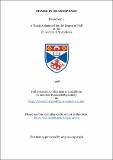Shame in Shakespeare
Abstract
This thesis is a critical study of the theme of shame in Shakespeare. The first chapter defines the senses in which shame is used. Chapter Two analyses the workings of shame in pre-renaissance literature. The argument sets aside the increasingly discredited shame-culture versus guilt-culture antithesis still often applied to classical and Christian Europe; then classical and Christian shame are compared. Chapter Three focuses on shame in the English Renaissance, with illustrations from Spenser, Marlowe, Jonson, and Milton. Attention is also paid to the cultural context, for instance, to the shaming sanctions employed by the church courts. It is argued that, paradoxically, the humanist aspirations of this period made men and women more vulnerable to shame: more aware of falling short of ideals and open to disappointment and the reproach of self and others. The fourth chapter is an introductory account of Shakespearean shame; examples are drawn from the plays and poems preceding the period of the major tragedies, circa. 1602-9. This lays the groundwork, both conceptually and in terms of Shakespeare's development, for the main part of the thesis, Part Two, which offers detailed readings of Hamlet, Othello, King Lear, Antony and Cleopatra, and Coriolanus. In Each case, a consideration of the theme of shame illuminates the text in question in new ways. For example, and exploration of shame in Hamlet uncovers a neglected spiritual dimension; and it is argued that, despite critical tradition, shame, rather than jealousy, is the key to Othello, and that Antony and Cleopatra establishes the attraction and limitation of shamelessness. The last Chapter describes Shakespeare's distinctive and ultimately Christian vision of shame. In a tail-piece it is suggested that this account of Shakespearean shame casts an intriguing light on a little-known interpretation of Shakespeare's last days by the historian E.R.C. Brinkworth.
Type
Thesis, PhD Doctor of Philosophy
Collections
Items in the St Andrews Research Repository are protected by copyright, with all rights reserved, unless otherwise indicated.

